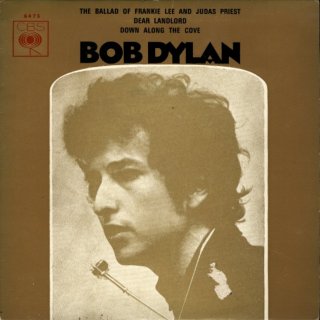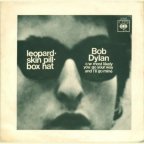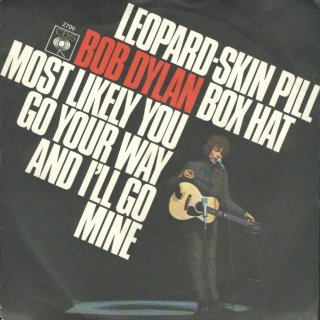"Angelina" is a song by American singer-songwriter Bob Dylan, recorded on March 26, 1981, for his album Shot of Love but not included on the record. The song was written by Dylan and produced by Jimmy Iovine. A version was released on The Bootleg Series Volumes 1-3 1961-1991 on March 26, 1991. A different take was issued on The Bootleg Series Vol. 16: Springtime in New York 1980–1985 in 2021. Critics have expressed their lack of understanding of the lyrics, whilst generally affording the song a positive reception. Dylan's rhyming of the name in the title of the song with "concertina", "hyena", "subpoena", "Argentina" and "arena" has attracted commentary, with scholar Nicholas Birns calling the rhymes "bravura and ... provocative".

"The Ballad of Frankie Lee and Judas Priest" is a song by American singer-songwriter Bob Dylan. It was released as the fifth track on his eighth studio album John Wesley Harding (1967). The track was written by Dylan and produced by Bob Johnston. It was recorded in one take on October 17, 1967, at Columbia Studio A in Nashville. The song's lyrics refer to two friends, Frankie Lee and Judas Priest. Lee asks Priest for a loan of money and Priest offers it freely. Lee spends it in a brothel over 16 days, then dies of thirst in Priest's arms. It has been suggested by commentators that the song refers to Dylan's relationship with his manager Albert Grossman or to his contractual negotiations with his record company. The song received a largely negative critical reception. Dylan has performed the song live in concert 20 times, from 1987 to 2000.

"Leopard-Skin Pill-Box Hat" is a song by American singer-songwriter Bob Dylan, which was released on the second side of his seventh studio album Blonde on Blonde (1966). The song was written by Dylan, and produced by Bob Johnston. Dylan has denied that the song references any specific individual, although critics have speculated that it refers to Edie Sedgwick, who Dylan had spent time with in December 1965.

"Stuck Inside of Mobile with the Memphis Blues Again" is a song by American singer-songwriter Bob Dylan from his seventh studio album, Blonde on Blonde (1966). The song was written by Dylan and produced by Bob Johnston. It has nine verses, each featuring a distinct set of characters and circumstances. All 20 takes of "Stuck Inside of Mobile with the Memphis Blues Again" were recorded in the early hours of February 17, 1966, at Columbia Records's A Studio in Nashville, Tennessee, with the last take selected for the album. This version also appears on Dylan's second compilation album, Bob Dylan's Greatest Hits Vol. II (1971).
"Bob Dylan's Dream" is a song written by Bob Dylan in 1963. It was recorded by Dylan on April 24, 1963, and was released by Columbia Records a month later on the album The Freewheelin' Bob Dylan.

"I Want You" is a song by American singer-songwriter Bob Dylan, which was released as a single in June 1966, and, later that month, on his seventh studio album, Blonde on Blonde. The song was written by Dylan, and produced by Bob Johnston. The song has been interpreted as a straightforward expression of lust, although critics have highlighted that the symbolism of the song is complex. It was the last song recorded for Blonde on Blonde, with several takes recorded in the early hours of March 10, 1966. It was included on Bob Dylan's Greatest Hits (1967). The song has received a largely positive critical reception, with a number of commentators highlighting Dylan's use of imagery, although some of the meanings are obscure.
"To Ramona" is a song by American singer-songwriter Bob Dylan, first released on his fourth studio album, Another Side of Bob Dylan (1964). The song was written by Dylan, and produced by Tom Wilson. The lyrics were started at the May Fair Hotel in London in May 1964, and finished during a week-long stay in the Greek village of Vernilya later that month. Dylan recorded all the tracks for the album, including the song, in a single three-hour session on June 9, 1964, at Studio A, Columbia Recording Studios, New York. Its narrator advises Ramona, who is preparing to return to "the South", not to follow the advice of others. Critics have suggested several different people as inspirations for the song, including Joan Baez, Suze Rotolo, and Sara Lownds.
"Let Me Die in My Footsteps" is a song written by American singer-songwriter Bob Dylan in February 1962. The song was selected for the original sequence of Dylan's 1963 album The Freewheelin' Bob Dylan, but was replaced by "A Hard Rain's a-Gonna Fall". This version was recorded at Columbia studios on April 25, 1962, during the first Freewheelin' session, and was subsequently released in March 1991 on The Bootleg Series Volumes 1–3 1961–1991.

"Most Likely You Go Your Way and I'll Go Mine", or "Most Likely You Go Your Way (and I'll Go Mine)", is a song by American singer-songwriter Bob Dylan. It was released as the first track on side three of his seventh studio album Blonde on Blonde (1966). The song was written by Dylan and produced by Bob Johnston. Dylan recounted that he had probably written the song after the end of a relationship. The song's narrator criticizes the lies and weakness of a woman, and says that he finds it hard to care. The final verse establishes that the woman has been unfaithful to the narrator by having a relationship with another man, as he suspected all along.
"Oxford Town" is a song written by American singer-songwriter Bob Dylan in 1962. It was recorded in Columbia's Studio A on December 6, 1962, for his second album, The Freewheelin' Bob Dylan.

The Bootleg Series Vol. 9: The Witmark Demos: 1962–1964 is a compilation album by American singer-songwriter Bob Dylan, containing demo recordings he made for his first two publishing companies, Leeds Music and M. Witmark & Sons, from 1962 to 1964. The seventh installment of the ongoing Bob Dylan Bootleg Series, it was released on October 19, 2010 on Legacy Records.
"Farewell", also known as "Fare Thee Well", is a song by American singer-songwriter Bob Dylan. Dylan wrote the song in January 1963. He considered it for his third album, The Times They Are a-Changin', but only attempted a few takes during the album's first studio session. Dylan's earlier recordings of "Farewell" found their way onto various bootlegs, and a collection of demos that included the song was released in October 2010 on The Bootleg Series Vol. 9 – The Witmark Demos: 1962–1964.
"Where Are You Tonight? " is a song by American singer-songwriter Bob Dylan, which was released as the closing track on his 18th studio album Street-Legal (1978). The song was written by Dylan, and produced by Don DeVito. Dylan has said that the song is about the individual's "enemy within." Critical interpretations of the song have suggested that it references Dylan's divorce as well as foreshadowing or announcing his conversion to Christianity, which became evident in the religiously-focused projects that followed the album. Commentators have also opined that there are allusions in the lyrics to the work of Robert Johnson.

"Obviously 5 Believers" is a song by American singer-songwriter Bob Dylan, which was released as the last track of side three of his double album Blonde on Blonde (1966), and was the B-side to the single release of "Just Like a Woman" for releases in America and some other countries. The song was written by Dylan and produced by Bob Johnston. It was recorded at Columbia Music Row Studios, in the early morning hours of a March 9–10, 1966 session. Four takes were recorded, although the first two were incomplete. It has been interpreted as a blues song about loneliness, with critics noting similarities in melody and structure to Memphis Minnie's "Chauffeur Blues". Dylan's vocals and the musicianship of the band on the track have both received critical acclaim, although the track has been regarded as insubstantial by some commentators.
"Temporary Like Achilles" is a song by American singer-songwriter Bob Dylan that was released on side three of his double album, Blonde on Blonde (1966). The song was written by Dylan, and produced by Bob Johnston. It was recorded at Columbia Studio A, Nashville, Tennessee on March 9, 1966. The song is a blues number that incorporates elements of Dylan's incomplete "Medicine Sunday", which he had recorded with members of the Band in New York in October 1965. The song describes a narrator's frustration at being kept waiting by a woman that he wishes to be romantically involved with, who is guarded by "Achilles". Some critics have suggested that the song references the Iliad.
"Talkin' Bear Mountain Picnic Massacre Blues" is a song by American singer-songwriter Bob Dylan. It was written by Dylan in June 1961, and recorded on April 25, 1962, at Studio A, Columbia Recording Studios, New York, produced by John Hammond. It is a humorous talking blues, which Dylan wrote after Noel Stookey gave him a press clipping about how the sale of forged tickets for a Father's Day picnic trip to Bear Mountain State Park had led to overcrowding and injuries.
"I Shall Be Free" is a song by American singer-songwriter Bob Dylan. It was recorded on 6 December 1962 at Studio A, Columbia Recording Studios, New York, produced by John Hammond. The song was released as the closing track on The Freewheelin' Bob Dylan on 27 May 1963, and has been viewed as a comedic counterpoint to the album's more serious material. Dylan has never performed the song in concert.
"You're No Good" is a song by Jesse Fuller that appeared as the opening track on Bob Dylan's eponymous debut album (1962). Eight takes were recorded by Dylan on November 20, 1961. He learnt the song directly from Fuller in Denver; Fuller's own recorded version was not released until May 13, 1963, on his album San Francisco Bay Blues. The song concerns the narrator's difficult relationship with a woman, and concludes with the narrator wanting to "lay down and die". Dylan's version is more uptempo than Fuller's, and has some changes to the lyrics; it has been positively reviewed by critics.
"I Shall Be Free No. 10" is a song by American singer-songwriter Bob Dylan, which was released as the fifth track on his fourth studio album Another Side of Bob Dylan (1964). The song was written by Dylan and produced by Tom Wilson. The song is a humorous talking blues, indebted to earlier songs including Lead Belly's "We Shall Be Free". Dylan opens the song by proclaiming that he is normal and average, but then acknowledges his reputation by singing the self-aware doggerel "Yippee! I'm a poet, and I know it/ Hope I don't blow it".







